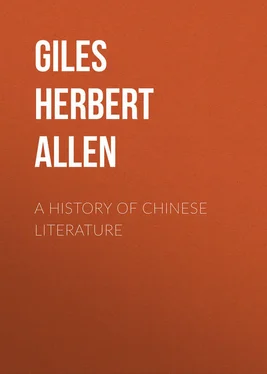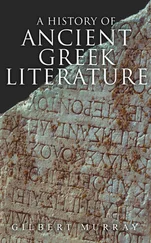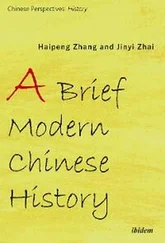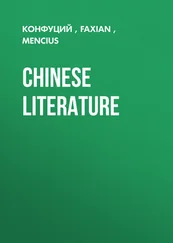Herbert Giles - A History of Chinese Literature
Здесь есть возможность читать онлайн «Herbert Giles - A History of Chinese Literature» — ознакомительный отрывок электронной книги совершенно бесплатно, а после прочтения отрывка купить полную версию. В некоторых случаях можно слушать аудио, скачать через торрент в формате fb2 и присутствует краткое содержание. Жанр: Критика, foreign_antique, foreign_prose, на английском языке. Описание произведения, (предисловие) а так же отзывы посетителей доступны на портале библиотеки ЛибКат.
- Название:A History of Chinese Literature
- Автор:
- Жанр:
- Год:неизвестен
- ISBN:нет данных
- Рейтинг книги:5 / 5. Голосов: 1
-
Избранное:Добавить в избранное
- Отзывы:
-
Ваша оценка:
- 100
- 1
- 2
- 3
- 4
- 5
A History of Chinese Literature: краткое содержание, описание и аннотация
Предлагаем к чтению аннотацию, описание, краткое содержание или предисловие (зависит от того, что написал сам автор книги «A History of Chinese Literature»). Если вы не нашли необходимую информацию о книге — напишите в комментариях, мы постараемся отыскать её.
A History of Chinese Literature — читать онлайн ознакомительный отрывок
Ниже представлен текст книги, разбитый по страницам. Система сохранения места последней прочитанной страницы, позволяет с удобством читать онлайн бесплатно книгу «A History of Chinese Literature», без необходимости каждый раз заново искать на чём Вы остановились. Поставьте закладку, и сможете в любой момент перейти на страницу, на которой закончили чтение.
Интервал:
Закладка:
“To the good I would be good. To the not-good I would also be good, in order to make them good.”
“Recompense injury with kindness.”
“Put yourself behind, and you shall be put in front.”
“Abandon wisdom and discard knowledge, and the people will be benefited an hundredfold.”
These last maxims are supposed to illustrate Lao Tzŭ’s favourite doctrine of doing nothing, or, as it has been termed, Inaction, a doctrine inseparably associated with his name, and one which has ever exerted much fascination over the more imaginative of his countrymen. It was openly enunciated as follows: —
“Do nothing, and all things will be done.”
“I do nothing, and the people become good of their own accord.”
To turn to the padding, as rendered by the late Drs. Chalmers and Legge, we may take a paragraph which now passes as chapter vi.: —
Chalmers: – “The Spirit (like perennial spring) of the valley never dies. This (Spirit) I call the abyss-mother. The passage of the abyss-mother I call the root of heaven and earth. Ceaselessly it seems to endure, and it is employed without effort.”
Legge: – “The valley spirit dies not, aye the same;
The female mystery thus do we name.
Its gate, from which at first they issued forth,
Is called the root from which grew heaven and earth.
Long and unbroken does its power remain,
Used gently, and without the touch of pain.”
One more example from Chalmers’ translation will perhaps seal the fate of this book with readers who claim at least a minimum of sense from an old-world classic.
“Where water abides, it is good for adaptability.
In its heart, it is good for depth.
In giving, it is good for benevolence.
In speaking, it is good for fidelity.”
That there was such a philosopher as Lao Tzŭ who lived about the time indicated, and whose sayings have come down to us first by tradition and later by written and printed record, cannot possibly be doubted. The great work of Chuang Tzŭ would be sufficient to establish this beyond cavil, while at the same time it forms a handy guide to a nearer appreciation of this elusive Tao.
CHUANG TZŬ
Chuang Tzŭ was born in the fourth century B.C., and held a petty official post. “He wrote,” says the historian Ssŭ-ma Ch’ien, “with a view to asperse the Confucian school and to glorify the mysteries of Lao Tzŭ… His teachings are like an overwhelming flood, which spreads at its own sweet will. Consequently, from rulers and ministers downwards, none could apply them to any definite use.”
Here we have the key to the triumph of the Tao of Confucius over the Tao of Lao Tzŭ. The latter was idealistic, the former a practical system for everyday use. And Chuang Tzŭ was unable to persuade the calculating Chinese nation that by doing nothing, all things would be done. But he bequeathed to posterity a work which, by reason of its marvellous literary beauty, has always held a foremost place. It is also a work of much originality of thought. The writer, it is true, appears chiefly as a disciple insisting upon the principles of a Master. But he has contrived to extend the field, and carry his own speculations into regions never dreamt of by Lao Tzŭ.
The whole work of Chuang Tzŭ has not come down to us, neither can all that now passes under his name be regarded as genuine. Alien hands have added, vainly indeed, many passages and several entire chapters. But a sable robe, says the Chinese proverb, cannot be eked out with dogs’ tails. Lin Hsi-chung, a brilliant critic of the seventeenth century, to whose edition all students should turn, has shown with unerring touch where the lion left off and the jackals began.
The honour of the first edition really belongs to a volatile spirit of the third century A.D., named Hsiang Hsiu. He was probably the founder, at any rate a member, of a small club of bibulous poets who called themselves the Seven Sages of the Bamboo Grove. Death, however, interrupted his labours before he had finished his work on Chuang Tzŭ, and the manuscript was purloined by Kuo Hsiang, a scholar who died A.D. 312, and with some additions was issued by the latter as his own.
Before attempting to illustrate by extracts the style and scope of Chuang Tzŭ, it will be well to collect from his work a few passages dealing with the attributes of Tao. In his most famous chapter, entitled Autumn Floods, a name by which he himself is sometimes spoken of, Chuang Tzŭ writes as follows: —
“Tao is without beginning, without end.” Elsewhere he says, “There is nowhere where it is not.” “Tao cannot be heard; heard, it is not Tao. Tao cannot be seen; seen, it is not Tao. Tao cannot be spoken; spoken, it is not Tao. That which imparts form to forms is itself formless; therefore Tao cannot have a name (as form precedes name).”
“Tao is not too small for the greatest, nor too great for the smallest. Thus all things are embosomed therein; wide, indeed, its boundless capacity, unfathomable its depth.”
“By no thoughts, by no cogitations, Tao may be known. By resting in nothing, by according in nothing, Tao may be approached. By following nothing, by pursuing nothing, Tao may be attained.”
In these and many like passages Lao Tzŭ would have been in full sympathy with his disciple. So far as it is possible to deduce anything definite from the scanty traditions of the teachings of Lao Tzŭ, we seem to obtain this, that man should remain impassive under the operation of an eternal, omnipresent law (Tao), and that thus he will become in perfect harmony with his environment, and that if he is in harmony with his environment, he will thereby attain to a vague condition of general immunity. Beyond this the teachings of Lao Tzŭ would not carry us. Chuang Tzŭ, however, from simple problems, such as a drunken man falling out of a cart and not injuring himself – a common superstition among sailors – because he is unconscious and therefore in harmony with his environment, slides easily into an advanced mysticism. In his marvellous chapter on The Identity of Contraries, he maintains that from the standpoint of Tao all things are One. Positive and negative, this and that, here and there, somewhere and nowhere, right and wrong, vertical and horizontal, subjective and objective, become indistinct, as water is in water. “When subjective and objective are both without their correlates, that is the very axis of Tao. And when that axis passes through the centre at which all Infinities converge, positive and negative alike blend into an infinite One.” This localisation in a Centre, and this infinite absolute represented by One, were too concrete even for Chuang Tzŭ. The One became God, and the Centre, assigned by later Taoist writers to the pole-star (see Book IV. ch. i.), became the source of all life and the haven to which such life returned after its transitory stay on earth. By ignoring the distinctions of contraries “we are embraced in the obliterating unity of God. Take no heed of time, nor of right and wrong; but passing into the realm of the Infinite, make your final rest therein.”
That the idea of an indefinite future state was familiar to the mind of Chuang Tzŭ may be gathered from many passages such as the following: —
“How then do I know but that the dead repent of having previously clung to life?
“Those who dream of the banquet, wake to lamentation and sorrow. Those who dream of lamentation and sorrow, wake to join the hunt. While they dream, they do not know that they dream. Some will even interpret the very dream they are dreaming; and only when they awake do they know it was a dream. By and by comes the Great Awakening, and then we find out that this life is really a great dream. Fools think they are awake now, and flatter themselves they know if they are really princes or peasants. Confucius and you are both dreams; and I who say you are dreams, – I am but a dream myself.”
Читать дальшеИнтервал:
Закладка:
Похожие книги на «A History of Chinese Literature»
Представляем Вашему вниманию похожие книги на «A History of Chinese Literature» списком для выбора. Мы отобрали схожую по названию и смыслу литературу в надежде предоставить читателям больше вариантов отыскать новые, интересные, ещё непрочитанные произведения.
Обсуждение, отзывы о книге «A History of Chinese Literature» и просто собственные мнения читателей. Оставьте ваши комментарии, напишите, что Вы думаете о произведении, его смысле или главных героях. Укажите что конкретно понравилось, а что нет, и почему Вы так считаете.












